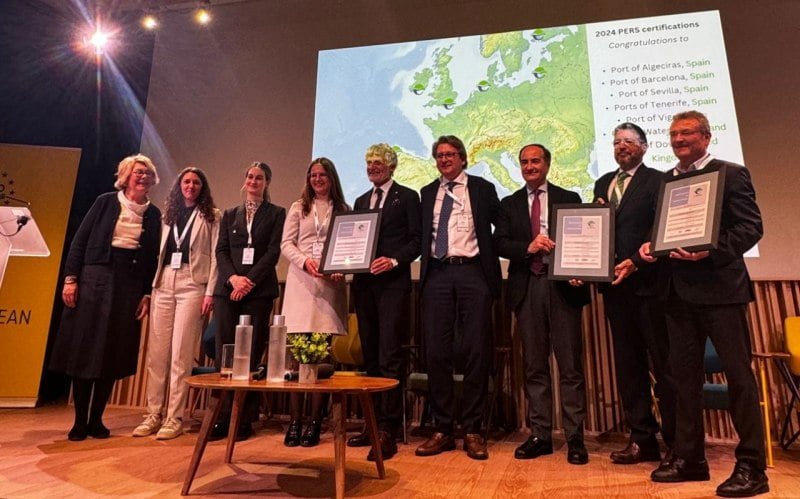The Klaipėda Port has become the first port in the Baltic States and one of 35 ports across Europe to achieve certification under the Port Environmental Review System (PERS). At the annual event of the European Sea Ports Organisation in Paris today, an official certificate recognizing Klaipėda Port as an environmentally friendly port was bestowed.
Klaipėda Port with the PERS certificate joins the club of the most environmentally friendly ports
“An environmentally and human-friendly port: from vision to action. That’s how I would describe our sustainability journey in recent years. In 2020, we initiated discussions about establishing a green port, urging companies within the port to join us. Today, we’re not only leading compelling and innovative projects in digitalization, environmental initiatives, and energy transformation, but also witnessing investments from port stevedoring companies towards implementing emission reduction projects. The award of this certificate to Klaipėda Port further validates our commitment to sustainability. Now, our focus is on maintaining it, as this document represents more than just a token,” said Algis Latakas, Director General of the Klaipėda State Seaport Authority.
The implementation of the port environmental review system commenced in 2023, involving the establishment of objectives, targets, and environmental performance indicators, an assessment of compliance with legal requirements, and the formulation of a performance improvement plan. These indicators will now serve as benchmarks to gauge the port’s progress in reducing its environmental footprint and achieving climate neutrality in two years.
“The PERS certificate binds us to long-term sustainable development and active participation in mitigating our environmental impact. Key environmental performance indicators include reductions in greenhouse gas (GHG) emissions, air emissions from ship movements and cargo transport, energy consumption, and the frequency of environmental incidents in port areas. In total, there are 34 such indicators,” explained Aistė Kubiliūtė, Environmental Coordinator at the Klaipėda State Seaport Authority.
The certification documents underwent assessment by Lloyd’s Register Quality Assurance (LRQA). Their conclusion affirms that the Klaipėda Port’s environmental strategy aligns with PERS requirements, aiming to minimize the adverse effects of port activities through the adoption of best management practices and cutting-edge technologies, with a preference for renewable energy sources and energy-efficient technologies. According to the certification company, the Klaipėda Port is committed to the principles of the circular economy.
PERS (Port Environmental Review System) stands as the sole environmental management standard for seaports, rooted in ESPO (European Sea ports Organisation) policy guidelines and a custom-made framework to aid ports in legislative compliance, fostering sustainable port operations, environmental protection, public health enhancement, and addressing climate challenges. ESPO has formulated guidelines for the implementation of a port environmental management system.
The certificate remains valid for a duration of two years, reflecting the ongoing commitment to environmental stewardship at Klaipėda Port. During this period, continuous efforts will be made to uphold and exceed the standards set forth, ensuring sustainable practices and environmental responsibility.

About Port of Klaipėda
Situated as Lithuania’s premier transport nexus, the Port of Klaipėda seamlessly intertwines sea, land, and railway routes, serving as the nation’s vital link to the global arena. Its pivotal role in Lithuania’s economy is undeniable, annually yielding returns for every citizen and fostering an environment conducive to business growth. Through steadfast investment in development and modernization.
The Port of Klaipėda has emerged as a beacon of advancement and competitiveness in the maritime industry. With direct connections to 70 countries worldwide, Klaipėda welcomes approximately 6,000 vessels annually, facilitating the transit of roughly 45 million tonnes of cargo. Moreover, the port serves as a gateway for tourism, welcoming up to half a million visitors and passengers via cruise and passenger ships each year, bolstering Lithuania’s position on the global stage.
Source Klaipėda Port

